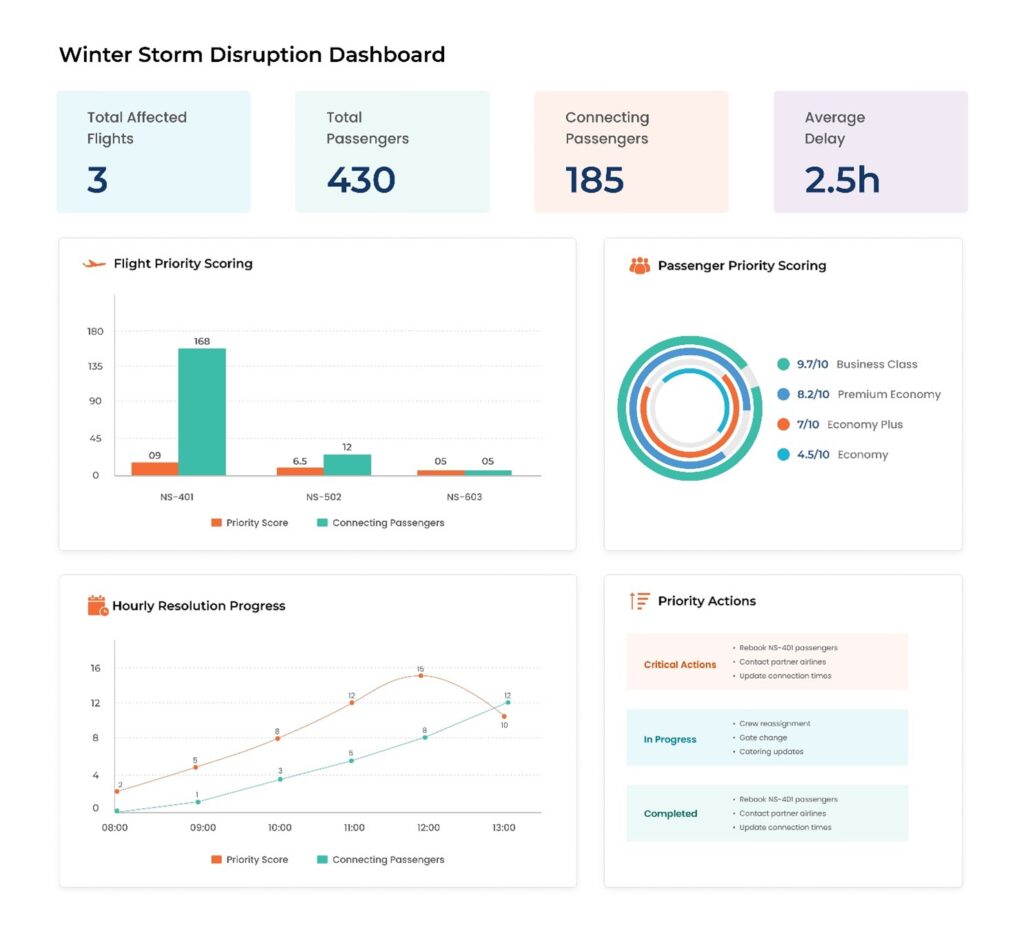Introduction
Flight disruptions are a costly challenge for airlines, with 87% of passengers expecting proactive rebooking during such situations, according to IATA. Managing these disruptions efficiently while controlling costs requires a data-driven approach. Flight scoring helps airlines make quick, informed decisions by prioritizing flights and passengers based on operational impact, financial considerations, and customer needs. This enables airlines to minimize costs, optimize resources, and enhance passenger experience even in critical scenarios.
Table of Contents
What is Flight Scoring? A Data-Driven Compass
Flight scoring is a sophisticated system that acts as a compass during disruptions. It assigns numerical values to flights and passengers based on various criteria, enabling rapid, informed decisions. This structured framework prioritizes resources, optimizes rebooking, and minimizes financial impact. It replaces ad-hoc reactions with precision and control.
Understanding the Scoring Systems
Effective flight scoring relies on understanding both passenger needs and flight characteristics.
- Passenger Scoring: Considers travel type (business/leisure, group bookings), demographics (age, family status), and special service requests (wheelchair assistance, medical needs) to personalize rebooking.
- Flight Scoring: Evaluates routing complexity, schedule factors (departure criticality, connection implications), commercial aspects (revenue potential, alliances), and operational resources (crew, aircraft availability) to optimize flight prioritization.
Scenario: A Winter Storm Disruption
Northern Skies Airlines faces a winter storm at its Boston hub. VoyagerAid helps manage the situation:
- Flight Scores:
- NS-401 (Boston to London): 9.0 (High passenger count, international connections)
- NS-502 (Boston to Philadelphia): 6.5 (Maintenance scheduled)
- NS-603 (Boston to Miami): 5.0 (Low connections, no urgency)
- Passenger Scores:
- Passenger X (Diamond member, Business Class, Dubai connection): 9.7
- Passenger Y (No status, Economy, London): 4.5
- Passenger Z (Gold member, Premium Economy, with children): 8.2
- Passenger W (Silver member, Economy Plus, tight domestic connection): 7.0
- VoyagerAid Actions: Prioritizes NS-401, rebooks Passenger X with lounge access, ensures smooth rebooking for Passenger Z’s family, expedites Passenger W’s connection, and rebooks Passenger Y on the next available flight.

Cost Reduction through Effective Scoring
Flight scoring directly impacts an airline’s bottom line by:
- Reducing stranded passenger costs: Efficient rebooking minimizes accommodation and compensation expenses.
- Minimizing disruption expenses: Faster decisions and optimized resource management lower overall costs.
- Improving re-routing efficiency: Strategic re-routing saves fuel and reduces delays.
- Enhancing resource management: Optimized crew utilization, aircraft deployment, and ground handling improve efficiency. These combined benefits can translate to a significant reduction in operational costs, potentially by 10-20% (depending on specific circumstances and data).
VoyagerAid: Intelligent Disruption Management
VoyagerAid offers:
- Real-time Intelligent Scoring: Automated scoring, dynamic updates, and instant prioritization.
- Seamless System Integration: Compatibility with existing systems, connecting to flight operations, crew management, and inventory.
- Comprehensive Disruption Management: Automated rebooking, resource optimization, proactive delay/cancellation management, and real-time communication.
- Data Analytics and Insights: Pattern recognition for predictive management, performance dashboards, and trend analysis. VoyagerAid’s analytics dashboard provides insights into passenger behavior during disruptions, allowing airlines to identify trends and proactively address potential issues. For instance, it can reveal common causes of delays or predict passenger rebooking preferences, enabling airlines to optimize their recovery strategies.
Conclusion: A More Resilient Future
Effective disruption management is crucial in today’s competitive landscape. With irregular operations costing the industry $25 billion annually, intelligent solutions are essential. VoyagerAid empowers airlines to:
- Make data-driven decisions.
- Optimize resource allocation and reduce costs.
- Enhance passenger experience.
- Build brand loyalty.
Ready to transform your disruption management? Contact us for a personalized demo.






